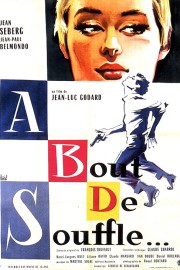Breathless
The first thing I noticed in watching “Breathless” again was the tone. It appears to be inspired by American film noir- which Jean-Luc Godard and the other filmmakers of the French New Wave came to appreciate after WWII- but it’s story stands apart from that tradition just enough to be, shall we say, a breath of fresh air. This is the second time I’ve watched Godard’s debut film, but in reality, it’s the first time it really came alive for me.
I’m not as well-versed with the French New Wave as I should be, but through years of reading and watching, I’m familiar enough to know why this film caused such a stir when it was released. For his first film, Godard and writer Francois Truffaut (another pillar in the New Wave) unearthed a previously-written story of main character Michel’s life and times as a playboy- reckless, a little womanizing (except for his seeming affection towards Patricia (Jean Seberg)), and always on the run from authorities.
Of course, part of the film’s intrigue is knowing that in a way, Godard, Truffaut, and their fellow New Wavers were not far removed from Michel- they were running from conventional cinema to bring it to the modern age. This isn’t the work of filmmakers looking to just pay homage to the past but to shake it up for the good of cinema’s future. The jump cuts. The heightened reality that isn’t quite fiction, but also not quite real-life. And the moods of the characters, so self-regarding, but no less compelling as a result. They aren’t really concerned with anyone but themselves, but we care nonetheless for them because the filmmakers do.
One of the boldest things Godard does is make the criminal aspect of Jean-Paul Belmondo’s Michel’s story almost secondary for most of the film. He hotwires cars. He kills a cop who begins to chase him, earning him the headline of the “Highway Killer.” But the idea of Michel as a criminal feels like an afterthought until Godard ramps up the tension later in the film. It’s hard not to see where Roger Ebert is coming from when he considers “Breathless” the predecessor of “Bonnie and Clyde,” “Badlands,” and just about every other criminal-on-the-lam drama since, but the genius in what Godard does trumps them all in the end, because by the time this criminal is within reach for the authorities, we’ve come to accept him and Patricia as people, even if they aren’t the type of people we’d want to be in real-life.
In the end, though, like Godard’s later “Alphaville” (which I reviewed last year), it’s more moods and moments that stand out in Godard’s masterful and intoxicating film. The jazz-like music that scores the film. The distance and objectivity with which Godard regards Michel and Patricia, refusing to judge them, simply seeing them. The technical prowess and originality that has made the film so influential for people who’ve come after (Scorsese, Chris Nolan, and Michael Mann- among others- seem to have learned this film’s lessons well). And of course, the performances by Belmondo (who became a star after this hit) and Seberg that captured these two’s relationship in a way that makes you care about them, even if all they care about is themselves.










